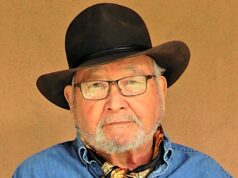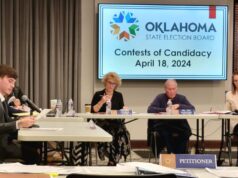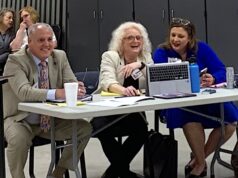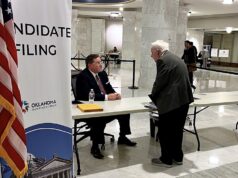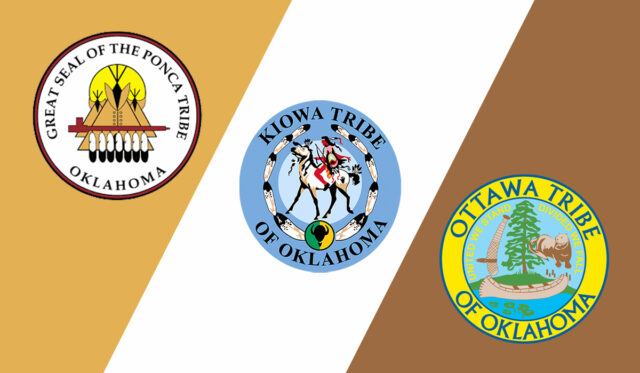
(Update: On May 10, the Kiowa Election Commission struck two constitutional amendments from the tribe’s June 1 ballot. On May 16, the District Court of the Ponca Tribe issued an order delaying the tribe’s May 18 election to June 22. The following article remains in its original form.)
With 38 federally recognized tribal governments, Oklahoma tribal elections are almost always in the works, and this month will feature a Star Wars Day election in the Kiowa and Ottawa tribes on May 4 and a May 18 election for the Ponca Tribe of Oklahoma.
Then, on June 1, members of the Kiowa Tribe will also be voting on a measure that would substantially expand the pool of people eligible for membership in the tribe by making all members of the tribe at the time of the amendment’s passage legally full-blood or “four-fourths degree” Kiowa citizens.
That constitutional amendment, proposed by the Kiowa Indian Council, states that tribal membership numbers will continue to decline “unless we act to open our membership to more of our young people who are critical to our struggle to preserve our language, our customs and our Kiowa way.”
The following article offers a basic overview of the three tribes’ elections over the next month.
Ponca Tribe election sees 18 candidates file
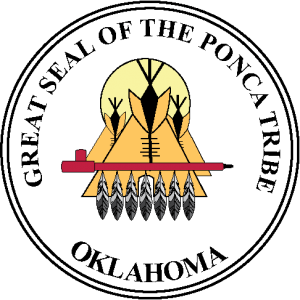
The Ponca Tribe is governed by a business committee with seven members who serve four-year terms. Four full-term seats appear on the ballot this year, and one vacant seat on the business committee is also scheduled to be filled during the election, according to a Bureau of Indian Affairs letter.
All 18 candidates will appear on the same May 18 ballot, and the top vote earners will be sworn in as members of the Ponca Business Committee. The tribe holds elections every two years for staggered terms on the committee.
According to the tribe’s website, elections were originally scheduled for April 20, but they were delayed until May 18. Posts on Chairman Oliver Littlecook’s Facebook page indicate the postponement stemmed from a contractor’s delay in performing background checks on the candidates as required by the Ponca Tribe’s election laws.
Adult members of the Ponca Tribe are able to vote by absentee ballot if deadlines are met for requests and submissions, but citizens may also vote in person at the Ponca Tribe Community Center in White Eagle from 8 a.m. to 5 p.m. Saturday, May 18.
The 18 candidates are:
- Sara Emily Bell, a tribal administrator for the Ponca Tribe;
- Christine Calls Him;
- Carla Carney, incumbent;
- Robert Collins, incumbent;
- Matilda Lucille De La Garza, incumbent;
- Earl Sanford Howe III;
- Molly Kemble, a tag clerk for the Ponca Tribe of Oklahoma;
- Rita Rene Kemble, former Ponca Tribe Native Connections Project liaison and candidate for the business committee in 2021;
- Cher Komesataddle;
- Darci Renee Lieb, a candidate for the business committee in 2021;
- Kinsel V. Lieb, a former member of the business committee;
- Roland Jack No Ear Jr.;
- Bobby Rhodd Sr.;
- Daniel Sherron, chairman of the Ponca Enterprise Gaming Board;
- Amos Simpson, operator of the Ponca Tribe’s Public Water Supply System;
- Scotty Simpson Jr., a candidate for the business committee in 2021; and
- Judith Wilson.
Ottawa Tribe of Oklahoma to elect 4 on May 4
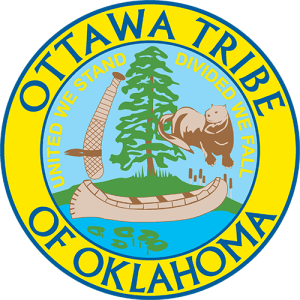
The Ottawa Tribe of Oklahoma is governed by an elected five-member business committee and five-member grievance committee plus the Ottawa Council made up of every member of the tribe over 18. On Saturday, May 4, three members of the business committee — the second chief, secretary-treasurer and first councilman — will be elected alongside one member of the grievance committee.
Three candidates filed to complete the one-year term for second chief: Mikal Scott-Werner, Beryl “Gene” Epperson and Jonathan Jacobs. Scott-Werner serves as the tribe’s second councilman, while Epperson previously served as secretary-treasurer. Jacobs has served as the tribe’s director of Indian child welfare for the past two and a half years.
In the race for secretary-treasurer, incumbent Brittany Bailey Long faces Kallista Keah. Keah worked in the finance industry for 12 years, while Long joined the business committee in August.
The vacant first councilman seat drew two candidates: Cody Hollenbeck and Orion Clint Henry. Henry has served on the tribe’s election committee for 10 years while Hollenbeck is an Army veteran who works in real estate in northeastern Oklahoma.
One vacant seat of the five-member grievance committee is up for election. The committee is in charge of resolving disputes involving vacancies, enforcement of the Indian Civil Rights Act and resolving disputes over the tribe’s constitution or business council resolutions.
Rachel Yeakley, Anastasia Stwyer and Lloyd Cox filed to run for the open grievance committee seat. Stwyer is an Ottawa University student in Kansas, while Cox is the Hickory Grove Fire Chief. Yeakley is a “full-time homemaker” with four children.
Polls are open at the Ottawa/Peoria Cultural Center in Miami for two hours between 10 a.m. and noon Saturday. Absentee ballots must be received by 4 p.m. Friday.
After legislative race May 4, Kiowa voters face constitutional reforms June 1
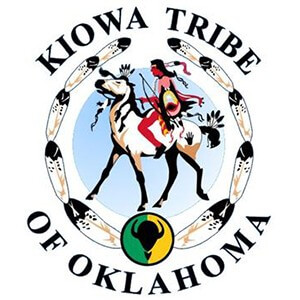
In the Kiowa Tribe, four tribal legislators’ seats are up for election this year, but after candidate filing, only one district, District 5, had multiple candidates pursue the office. Incumbent Anita Johnson is seeking another term in the Kiowa Legislature and faces a challenge from Tiya Rosario that will be decided Saturday, May 4.
Incumbents Michael Primus, Ben Lucero Wolf and Warren Queton were reelected without opposition.
During the tribe’s June 1 election, citizens will also vote to approve an annual budget and two resolutions proposed by the Kiowa Indian Council. The KIC includes every member of the tribe over 18 and meets annually on the first Saturday of April. Members can propose constitutional amendments via resolutions during the April meeting.
During the April 6 KIC gathering, two different resolutions were advanced for potential amendment of the Kiowa Constitution, which was approved by citizens in 2017.
Resolution 2 would amend Article 14, Section 2 of the tribe’s constitution to remove the requirement that at least 30 percent of eligible voters must cast a vote to approve constitutional amendments. The resolution would instead require “a majority vote of the eligible voters who vote in the special election” for passage of a constitutional amendment.
The KIC advanced the resolution with 137 votes in favor, nine people opposed and 17 abstentions. The resolution called the current 30 percent threshold “vague” and “too high” while accusing it of preventing “needed amendments to the constitution.” There has not been a constitutional amendment passed since Kiowa Tribe’s constitution took effect in 2017. Similarly, three proposed amendments to the Cheyenne and Arapaho Tribes’ Constitution failed earlier this year owing to a similar 30 percent requirement.
Also appearing on the Kiowa Tribe’s June 1 ballot, Resolution 3 would make three amendments to Article 4 of the constitution to update language, expand the pool of eligible tribal citizens and remove reference to a Bureau of Indian Affairs approval process. The BIA no longer has final authority over the determination of membership in the Kiowa Tribe or amendments to the tribe’s constitution. Resolution 3 advanced to the June 1 ballot with slightly more opposition at the KIC, with 128 votes in favor, 30 votes opposed and 15 abstentions.
Currently, there are about 10,600 enrolled Kiowa citizens. To be eligible for membership in the Kiowa Tribe, a person must be either an original allottee of the Kiowa Tribe or one of their descendants with at least a one-fourth blood quantum. The Kiowa Constitution assigns all original allottees a full blood quantum, or “four-fourths degree.”
The second change in Resolution 3 would substantially expand the pool of people eligible for membership in the Kiowa Tribe by making all members of the tribe at the time of the passage of the amendment legally full blood, or “four-fourths degree.” If passed, the amendment would effectively grant citizenship to children and grandchildren of current tribal citizens.
But the wording of the resolution has caused some concern among potential voters regarding how someone’s blood quantum might be treated differently depending upon whether their parents or grandparents are living or deceased.
Because deceased people would not be enrolled members on the date of the amendment’s potential passage, their blood quantum and the blood quantum of their descendants who are not one-fourth members would fail to be increased. On the other hand, a living one-fourth member whose child is currently one-eighth would become a full-blood Kiowa citizen, and their child would become one-half.
Resolution 3 includes rare insight into a tribe’s internal discussions to change membership requirements, outlining several reasons the KIC proposed the amendment, including:
- “Many elder Kiowa members [desired] that changes be made to the Kiowa Constitution to allow many of their children and grandchildren” to become members;
- “The blood quantum of our Kiowa people continue to decline, leading to the elimination of many young Kiowa people from being eligible to be admitted to our membership;” and
- Recognition that “tribal membership numbers will also continue to decline unless we act to open our membership to more of our young people who are critical to our struggle to preserve our language, our customs and our Kiowa way.”
If Kiowa voters approve Resolution 3 and adjust their blood-quantum membership requirements, they would join the Cheyenne and Arapaho Tribes in broadening their pool of eligible citizens. Cheyenne and Arapaho voters dropped blood quantum requirements from one-fourth to one-eighth in 2021.










